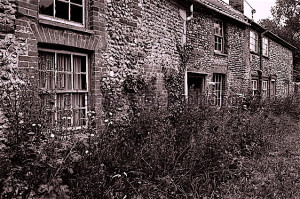Today, most rural slums have either fallen into ruin or been gentrified by second home owners. In the thirties, however, some of the terrible privations characteristic of the urban slums described by George Orwell in The Road to Wigan Pier , were equally true of many rural slums. In an article entitled ‘Clean Up Our Country Slums’ in the April 6th 1934 issue of the news weekly Everyman, Orwell’s contemporary, the journalist Hamilton Fyfe (1869 – 1951), who was also a man of the Left, went behind the façade of a pretty country cottage inhabited by some agricultural tenants and was shocked to find damp walls, cracked plaster, peeling wallpaper and a shared sink.
‘All their water they have to fetch in pails from a farm a couple of hundred yards away. They have no drainage, no light, no indoor sanitation ( as the house agents delicately put it); they enjoy none of the amenities that so may of us consider absolute necessities of life. And these cottage are not exceptional, They are typical of the homes in which our country folk mostly live…I could take you to a house where in two small rooms father, mother, grown-up son and four children ( thirteen to nine) sleep. I could show you rows of houses on the outskirts of little towns, where except for the fresher air, conditions are every bit as bad as in the black spots of London, Liverpool or Glasgow’
According to Fyfe, two Acts of Parliament:
‘make it possible for owners of cottages to borrow money on easy terms so that they may “ reconstruct and improve” their property, put in water supply, baths, light and more wholesome sanitary arrangements. Owners have been very slow, however, in asking for loans. The truth is that the farmer was badly stung over the purchase of his farm from the local viscount and is really not able to spend money on repairs. And he owes his bank so much that he shrinks from the idea of borrowing and more. The right solution, the only solution I can see, is that the community should take over the cottages and make them fir to live in. But most councils are as unwilling as most individuals to take advantage of the Acts of Parliament.

